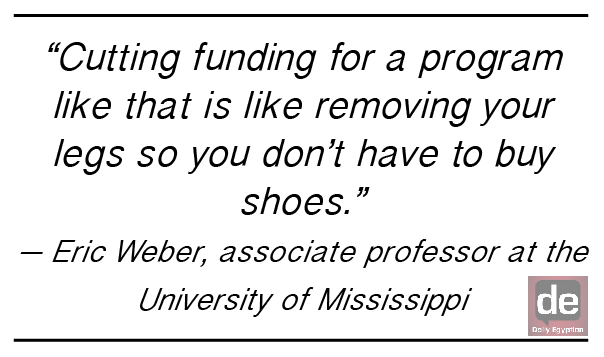Cuts put Dewey center’s global influence at risk
April 12, 2015
Most of the basement in Morris Library is a designated silent zone, but the Center for Dewey Studies — an outfit not bound to that policy — continues to resonate around the world.
John Dewey was the most important educational thinker of his era, and possibly the 20th century as he fundamentally changed the approach to teaching and learning, according to the PBS documentary series “Only a Teacher.”
The center, which is home to Dewey’s works and studies, is one of the non-academic units asked by the university to prepare for a 50 percent cut in state funding, equating to nearly $76,000.
Advertisement
Larry Hickman, director of the center, said the proposed cut is not well thought out, because some staffers have their salaries guaranteed by contract.
“[This cut] would be a serious blow to the work of the center, since we have already been cut a number of times and are down to the minimum staff required to do our work,” Hickman said.
It comes in the wake of Gov. Bruce Rauner’s proposed slash to higher education funding. If passed, his budget would cut funding to state universities by 31.5 percent — setting state funding for SIU back to where it was during the 1985-1986 school year.
“The new governor says he is going to be spending ‘billions and billions’ on infrastructure, but he says he wants to cut higher education,” Hickman said. “Does he not understand that education is infrastructure?”
The state would save less than $20,000 if the nearly $76,000 cut is passed, Hickman said.
The state must pay some of the Dewey Center’s staff, as about $56,000 of the $76,000 is contractually obligated to salary. The remainder is all the state can get away with cutting without breaking the terms of the contract, Hickman said.
“What it would mean is, for [a savings of] very little money — less than $20,000 — the Dewey Center would be kneecapped,” he said. “The question becomes, ‘Is the Dewey Center worth $20,000 to the university?”
Advertisement*
The money can be moved from the budget of one unit to another, but it cannot be cut, Hickman said. The College of Liberal Arts may be left responsible for making up the difference, he said.
“It’s a shell game — moving around money rather than saving it,” Hickman said.
Eric Weber, associate professor of Public Policy Leadership at the University of Mississippi, said the Center for Dewey Studies is the reason many people have heard of SIU.
“The Center for Dewey Studies was integral to the reason I came [to SIU] as well as my success,” said Weber, who got his doctorate degree in philosophy from the university in 2007. “It is a mistake to not fully support one of the premier programs that you can tout as being absolutely phenomenal at SIU.”
The center, founded in 1961, is the greatest resource on the planet for those who wish to study the works of John Dewey, he said.
“It is clear that we’re not living up to the wisdom that [Dewey] had to offer about how to do things best in public education,” Weber said. “He is one of the people who contributed to the movement that made American schools the envy of the world. At least, they were for a long time.”
John Dewey took his democratic theories and applied them to the concept of education. In Dewey’s educational theory, the teacher was not an authority figure but a coach. It was one of peer-based learning that centered on real-world experience and concept development, Hickman said.
Dewey tried to steer public-education away from standardized education, textbook memorization, authoritative appeals and strict teacher instruction.
Hickman said if that sounds familiar, it is because of No Child Left Behind testing — a policy implemented by former President George W. Bush, which makes states set standardized curricula for public schools. If school districts do not meet these standards, they are subject to government intervention and restructuring.
Dewey said education is a fundamental part of a healthy society, especially a democracy.
The center has furthered Dewey’s vision by publishing the equivalent of 113 print volumes — averaging 550 pages each — and about 25,000 items of correspondence since Hickman became director in 1993.
“The Dewey Center gets the university a lot of bang for their buck,” Hickman said. “We’re doing a lot out there — beyond the walls of SIUC.”
During the last 20 years, Hickman has visited various educational institutions overseas, delivering an average of one lecture per month on behalf of the center, while representing the university as a whole.
Hickman and Weber said the center serves as a prestigious representation of SIU to scholars and teachers internationally, bringing attention to other university programs that would otherwise go unnoticed.
“[This cut] would be a tragic underappreciation of one of the jewels at SIU,” Weber said.
Hickman said because Dewey’s teachings have gained traction worldwide, in large part because of the center, it is ironic SIU would choose to cut funding to such a driving force of contemporary educational policy.
“There is no doubt in my mind that one of the premier, best-in-the-world programs that SIU has is the Center for Dewey Studies,” Weber said. “Cutting funding for a program like that is like removing your legs so you don’t have to buy shoes.”
Advertisement









